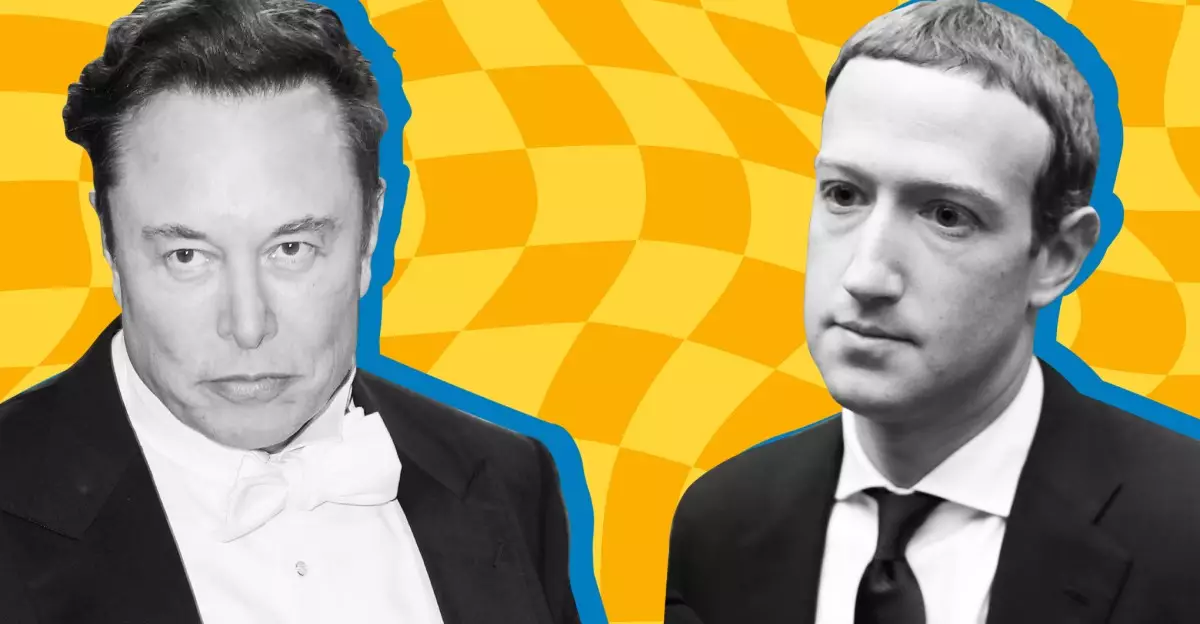In an unexpected twist within California’s urban landscape, the echoes of Elon Musk and Mark Zuckerberg have inadvertently taken over pedestrian crosswalks. Recently, a tech-savvy prankster hacked crosswalk buttons in cities like Palo Alto, Redwood City, and Menlo Park, replacing their routine voice prompts with AI-generated messages mimicking these tech giants. The ramifications of this prank reach beyond mere amusement; they expose societal anxieties about technology’s role in daily life and the personalities behind Silicon Valley’s curtain.
This clever subversion occurs in a fraught environment marked by a growing public fear of AI and surveillance. By embedding their stylized banter within essential pedestrian communication, the prank underscores how technology can be repurposed for humor, while also serving to critique the very titans who dominate that arena.
Subverting Expectations with Satire
The hacker’s bold choice to utilize the voices of Musk and Zuckerberg is particularly significant in a landscape dominated by discussions of tech overreach and ethical implications of AI. At first glance, these reimagined voice prompts—Musk pleading for friendship and Zuckerberg hilariously boasting about “undermining democracy”—may elicit laughter. Yet, the comedic element acts as a magnifying glass, revealing the darker undercurrents of societal discontent surrounding these figures.
For example, Musk’s scripted plea for camaraderie may resonate with the tech entrepreneur’s well-documented struggles with isolation, while Zuckerberg’s commentary alludes to serious accusations regarding Facebook’s influence in political spheres. The audacity of the messages, particularly the self-reflective humor surrounding contemporary tech dilemmas, cleverly balances between parody and poignant critique.
Navigating the Ethics of AI and Public Safety
While these imitations serve as laughable bites of satire, they also bring to the forefront critical conversations about public safety and the ethical integration of AI in everyday applications. The original voices of crosswalk prompts are designed to assist visually impaired individuals, directing them safely across busy streets. When those prompts morph into mockeries from high-profile leaders, a significant question arises: Does humor come at the cost of accessibility?
Although evidence suggests that these AI-voiced messages were additive rather than wholly replacing vital safety communications, the incident raises concerns about potential risks involved in integrating AI technology into public services without thorough oversight. Such pranks can lead to confusion among pedestrians, turning a tool meant to enhance safety into an object of ridicule. As societies increasingly embed AI into their infrastructure, this prank stands as a reminder of the need for rigorous ethical scrutiny.
The Cultural Critique Embedded within Comedy
Where this incident truly shines is its ability to shed light on broader cultural conversations surrounding authority and trust in technology. The satire is razor-sharp, poking fun at Musk and Zuckerberg’s personas—both characterized by their immense power yet also by their human frailties—at a time when tech giants find themselves on shaky ground with public trust.
When Musk’s faux voice partially claims, “I’ll give you a Cybertruck, I promise,” it becomes more than just absurd humor; it simultaneously critiques the often wild promises made by tech innovators. Similarly, Zuckerberg’s AI voice ingeniously references the many controversies surrounding Facebook’s practices, thus offering a tongue-in-cheek commentary on how such platforms continue to shape realities in ways that are anything but benign.
Reflection in an AI-Dominated Era
In an era where artificial intelligence is impinging upon more areas of life than ever before, this incident serves as a reflection of the complex relationship between society and technology. It acts as a contemporary lens through which we can examine our ambivalence towards these lexical embodiments of innovation and disruption. The hack reflects a collective acknowledgment that while technology can enhance our lives, it can also be hijacked for mockery and critique.
This mischievous stunt not only entertains but also calls attention to the need for balanced discussions about tech accountability. Such conversations should encourage both innovation and ethical considerations surrounding the very individuals and corporations driving these changes.
Through humor, we’ll navigate the murky waters of technology, ultimately hoping that our laughter can serve as a catalyst for necessary dialogue in an ever-evolving digital landscape.

